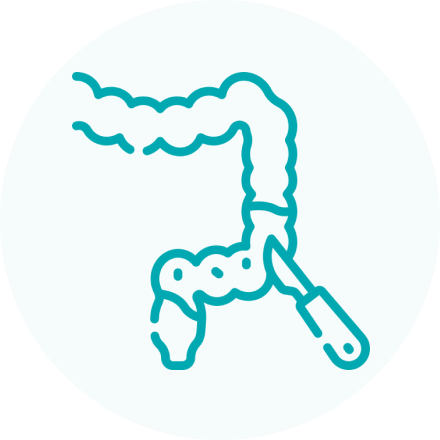
Colorectal surgery
Our experienced surgeons provide expert management for colorectal conditions using exceptional technologies.
Bowel cancer
Bowel cancer is one of the most common types of cancer and various treatment options are available.
With early detection of bowel cancer, almost 99 percent of cases can be successfully treated..[1]
From 1 July 2024, the eligible screening age for the National Bowel Cancer Screening Program was lowered from 50 to 45.
If you've recently done a bowel cancer screening test, you should receive your test results within two weeks. A copy will also be sent to the general practitioner (GP) that you nominated on your form.
Talk with your GP if you are experiencing symptoms for two weeks or more.
Symptoms include: Recent, persistent change in bowel habits, a change in shape or appearance of your poo, blood in your poo or rectal bleeding, bright red or very dark blood should never be ignored, frequent gas pain, cramps, a feeling of fullness or bloating in the bowel or rectum and unexplained anaemia.
If results of the NBCSP return positive, have symptoms or have a higher risk of bowel cancer, you may be referred on to see a Knox gastroenterologist, endoscopist or surgeon for further tests.
Treatment options include:
- Laparoscopic colorectal surgery – this is a keyhole procedure to remove the cancer and sometimes part of the bowel.
- Robotic surgery – in this minimally-invasive procedure, your surgeon uses advanced robotic technology to visualise the operation site and guide the instruments.
- Colectomy/anterior resection – this involves removing a bowel cancer along with part of your colon or rectum on either side of the lesion.
- Stomal therapy – a stoma is a small opening in your abdomen used to remove body waste into a special bag. You might need a stoma after bowel cancer surgery. Specialised stomal therapy nurses help ensure the stoma heals and functions well. In many cases, a stoma is only temporary and can be closed by surgery at a later date.
- Colonoscopy – your surgeon uses a flexible telescope to look inside your large bowel (colon) and take small samples of tissue to test if needed. If you return a positive test in the National Bowel Cancer Screening Program (a positive faecal occult blood test), you will usually need to have a colonoscopy to screen for abnormalities in the colon. Our team of colorectal surgeons can provide this service for you.
- Polyps – a polyp is an abnormal, wart-like growth protruding from the inner surface of the bowel wall. Most are benign. Over 90% of polyps can be removed completely and safely during a colonoscopy.
(Read More- blog)
[1] https://www.bowelcanceraustralia.org/symptoms
Pelvic floor
Your pelvic floor is like a sling that supports the organs in your pelvis. Pregnancy, childbirth, ageing and other conditions can affect the pelvic floor, causing a range of conditions. Some of the most common include:
- Incontinence – which can involve loss of control over your bladder (urinary incontinence), bowel (faecal incontinence) or both.
- Pelvic organ prolapse – in which the pelvic organs sag and may bulge into the vagina or exterior to your body.
- Fistula – an abnormal connection between two body parts, such as between the vagina and rectum.
We use various procedures to accurately diagnose and manage pelvic floor conditions. These include:
- Endorectal ultrasound – this involves gently inserting a narrow ultrasound probe about 2-3 cm into the anal canal to assess the muscles and structure of the anal canal and pelvic floor.
- Anal manometry – this test measures how well your anal and rectal muscles are working.
- Pelvic floor exercises – to help strengthen your pelvic floor muscles.
- Biofeedback – this helps you gain control over pelvic floor muscle function by giving you feedback as you use those muscles.
- Sacral nerve modulation – this procedure helps improve incontinence symptoms by gently stimulating the nerves that control bladder and bowel function (the sacral nerves) using an implantable electronic device very similar to a pacemaker for your heart.
Benign bowel surgery
Our surgeons also see people with benign bowel conditions, including:
- Bowel endometriosis – endometriosis of the large bowel can affect the bowel in the abdomen and pelvis. Some people need surgery to remove the endometriosis and the bowel if conservative measures have not provided enough relief.
- Diverticular disease – in this condition, small pouches protrude from the wall of the colon. Treatment focuses on clearing infection, reducing inflammation, and resting the colon. Some people benefit from surgery to remove an affected part of the colon, especially if their diverticular disease is recurrent, severe or complicated.
- Surgery for obstructive constipation – if you have a bulge or weakness at the front of your rectum that causes difficulty emptying your bowels, surgery can correct it and normalise bowel function.
- Reversal of Hartmann's procedure – which involves rejoining the two ends of your large bowel after a Hartmann’s procedure.
- Appendicitis – surgery removes the inflamed appendix to prevent serious complications.
Anal canal
- Anal fistula and abscess – an anal fistula is an abnormal connection between your anal canal and the skin near your anus. Most need surgery to heal.
- Anal fissure surgery – an anal fissure is a split in the skin of the anal canal. You may need surgery if conservative treatment has not worked. Surgery usually involves making a small cut in the anal sphincter muscle.
Haemorrhoids
Procedures used to manage this common condition include:
- Haemorrhoid banding – your surgeon uses a device to place a silicone band onto the lining of your anal canal This blocks blood flow to the haemorrhoid, causing it to shrink.
- Open haemorrhoidectomy – this involves surgically removing haemorrhoids, usually under a general anaesthetic.
- Haemorrhoid artery ligation – this procedure involves finding and stitching closed the small arteries that supply blood to problematic haemorrhoids.
- Pruritus ani – in this condition, the skin around the anus becomes itchy, irritated, and sensitive. Treatment involves good anal hygiene, keeping anal skin clean and dry, and sometimes medication for the itch.
- Anal dysplasia – cells in the anus become abnormal and may become cancerous. Treatment involves destroying the affected cells (eg with heat or laser) or removing them surgically.
- High resolution anoscopy – your surgeon shines a light through a hollow, thin tube (called an anoscope) to examine the anal canal and rectum to look for pre-cancerous or cancerous cells.
Inflammatory bowel disease (IBD)
- Crohn's disease – this condition affects the entire gastrointestinal tract. Some people need surgery to help manage the symptoms.
- Ulcerative colitis – this condition only affects the large bowel. Surgery may be necessary if medical treatment is no longer controlling the symptoms well enough or to manage complications.
Patient resources




